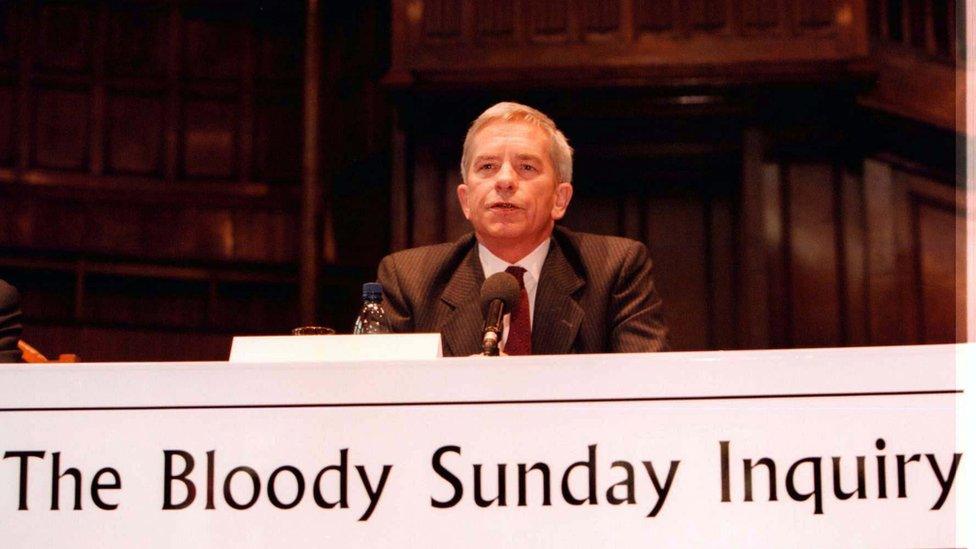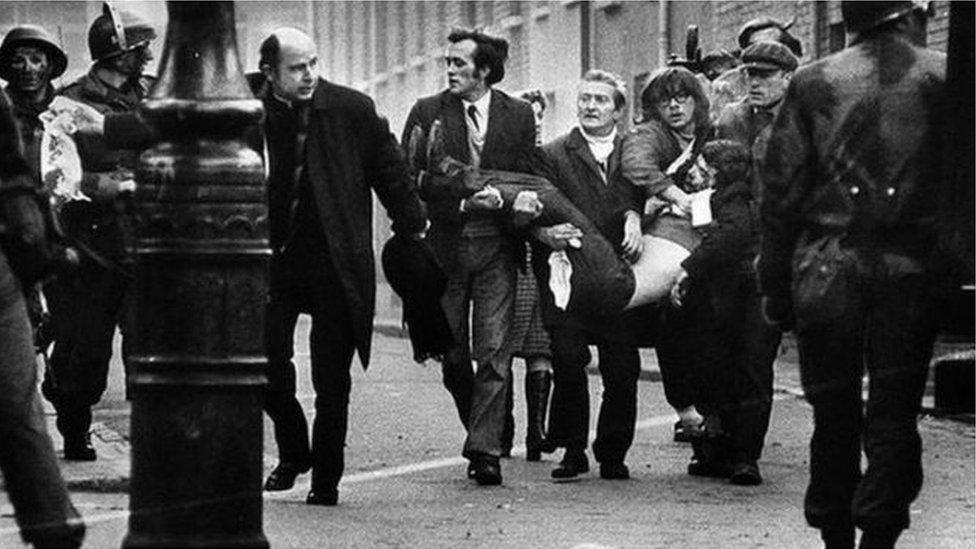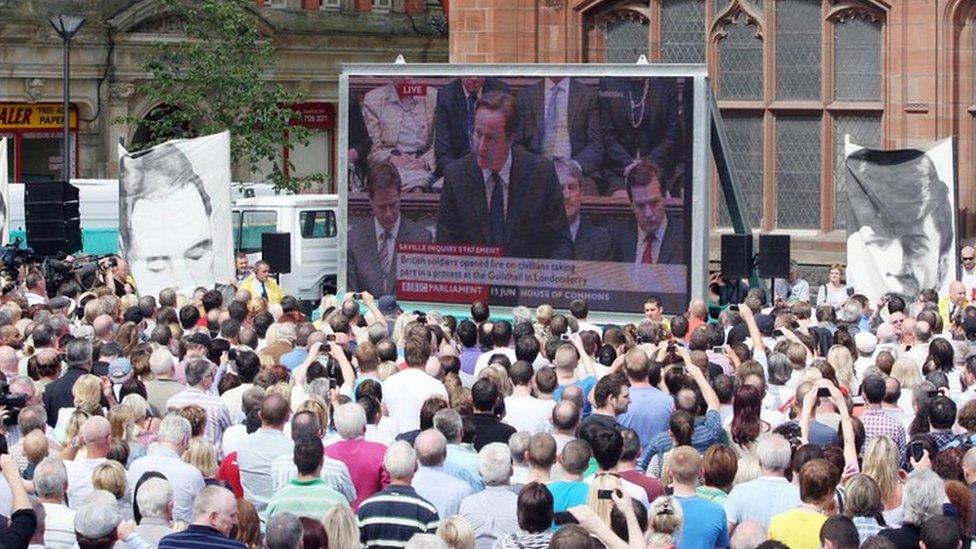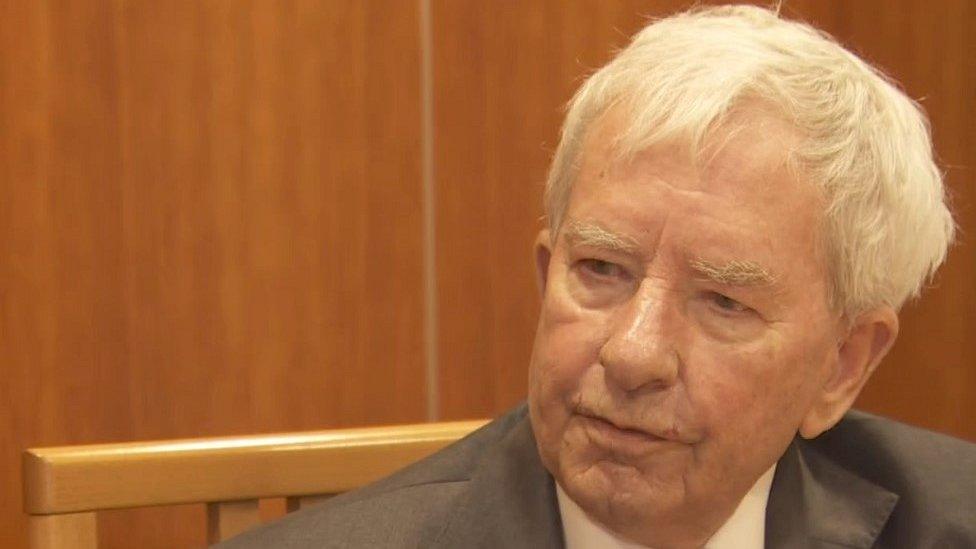Bloody Sunday: PPS still reviewing decision not to prosecute suspects
- Published

Lord Saville chaired the Bloody Sunday inquiry, which looked into the events of 30 January 1972
The Public Prosecution Service (PPS) said it is continuing to review its decision not to prosecute a number of suspects in relation to events on Bloody Sunday.
Thirteen people were shot dead in Londonderry when members of the Parachute Regiment opened fire on civilians in 1972.
To this day, only one soldier involved has been brought to trial for his role.
Today marks the 10th anniversary of the publication of the Saville Report.
In a statement, a spokesperson for the PPS said decisions "remain ongoing" and they are proceeding "as expeditiously as possible".
The spokesperson said "interested parties, including the victims and families, will be notified when decisions have been finalised" as per their "commitment to inform those directly involved first".
They added that they "are aware of the desire of all those affected to know the outcomes" but said that their work "is complex".

Thirteen people were shot dead on Bloody Sunday
Speaking to BBC Radio Foyle, Lord Saville reiterated that the "public inquiry I conducted cannot make findings of criminal conduct because we are not a judge, jury in a criminal trial".
Lord Saville said "he would be interested to see what happens" and said there "were arguments for and against maintaining prosecutions over such a long period of time".
"As time goes by it shouldn't mean that justice can no longer be done," he told the programme.
But he added that he did appreciate that "as time goes by it does get more difficult".
Lord Saville said his offer to meet the families of Bloody Sunday still stands, but "not to discuss the findings of the report".

Crowds cheered as they watched Prime Minister David Cameron deliver the findings of the report.
Ten years ago, relatives of those killed stood on the steps of the Guildhall with thousands packed into the square to hear Mr Cameron's apology.
Speaking to MPs in the House of Commons, Mr Cameron said: "What happened should never, ever have happened. The families of those who died should not have had to live with the pain and the hurt of that day and with a lifetime of loss.
"Some members of our armed forces acted wrongly. The government is ultimately responsible for the conduct of the armed forces and for that, on behalf of the government, indeed, on behalf of our country, I am deeply sorry."
'An incredible moment'
John Kelly, whose brother Michael was killed on Bloody Sunday, recalled his memories of that day.
Speaking to BBC Radio Foyle, Mr Kelly described the "surreal moment" the families walked out to the thousands gathered in Guildhall to cheers and applause.
"I definitely didn't expect Mr Cameron's apology, we were quite frankly expecting the opposite, but it really was a fantastic moment and I believe the people of Derry appreciated it and the families did at the time," Mr Kelly said.
He added that having no one prosecuted for his brother's death was "a real kick in the teeth" but said they "have not given up" in fighting for convictions.
The prime minister's apology prompted leaders of the Protestant church denominations to go to the Bogside area of the city the following day and meet with victims' relatives.
'A cloud being lifted'
It was viewed as hugely symbolic gesture by the leaders - Church of Ireland Bishop of Derry and Raphoe Ken Good; then Presbyterian Moderator Norman Hamilton; and President of the Methodist Church in Ireland Paul Kingston - who arrived together at the Bloody Sunday memorial in Rossville Street, close to where the majority of the killings took place.
Speaking to BBC Radio Foyle, Ken Good said that the Saville Report helped "facilitate a time of healing and a strengthening of relationships between communities".
He told the programme "it was a very moving day".
He said that community relations are "in a different place a decade on" because of that momentous day and also because of the tireless work of community workers in the city.
- Published27 September 2018

- Published13 March 2019

- Published15 June 2010